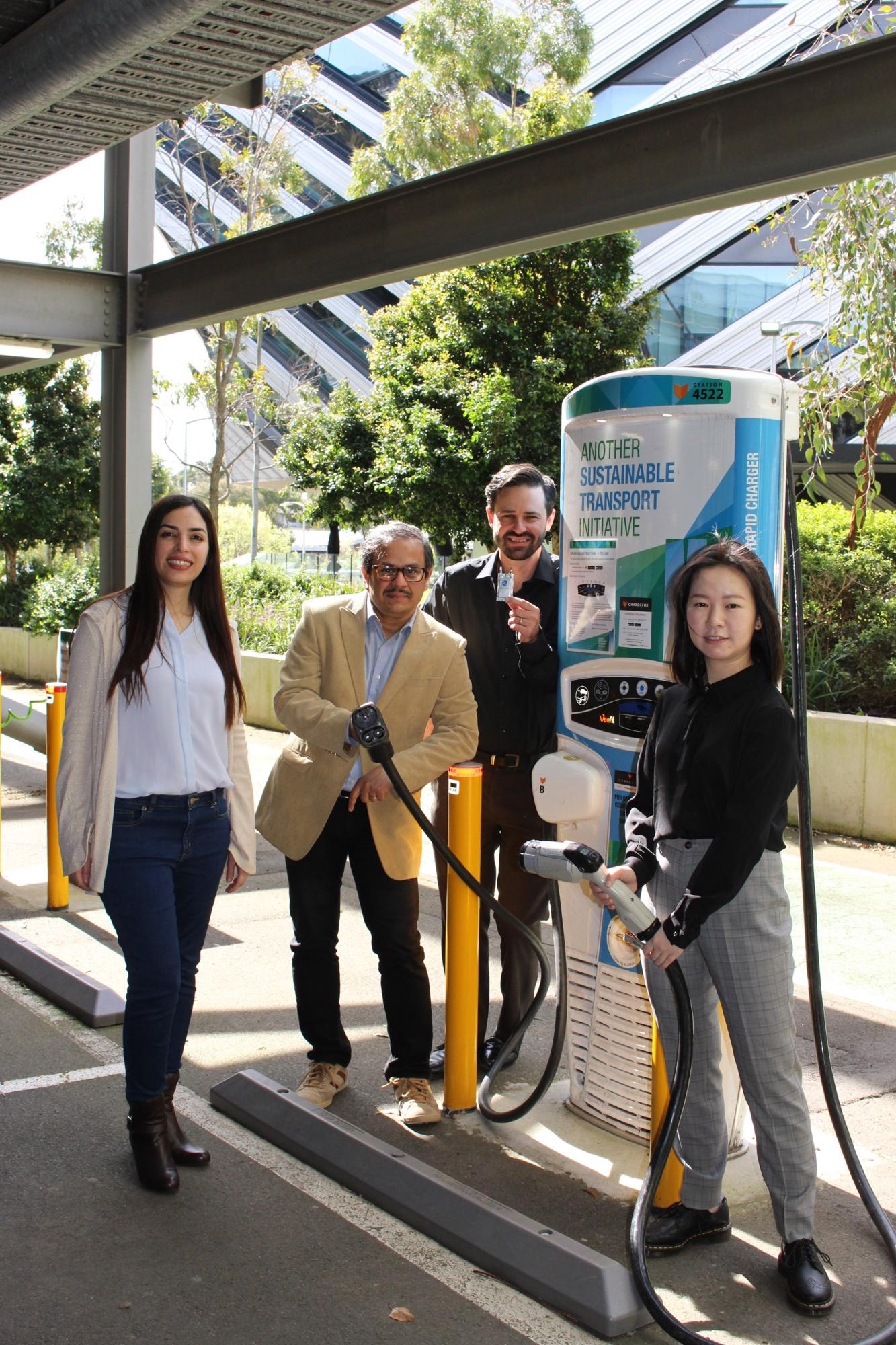Researchers from the Monash Energy Institute have developed a longer-lasting, lighter, more sustainable rival to the lithium-ion batteries that are essential for aviation, electric vehicles and submarines, by just using sugar.
 Melbourne to Sydney on one charge: the new lithium-sulfur battery technology could store two to five times more energy. The Monash Energy Institute team (L-R): Mahdokht Shaibani, Mainak Majumder, Matthew Hill, and Yingyi Huang. Image Credit: Monash Energy Institute.
Melbourne to Sydney on one charge: the new lithium-sulfur battery technology could store two to five times more energy. The Monash Energy Institute team (L-R): Mahdokht Shaibani, Mainak Majumder, Matthew Hill, and Yingyi Huang. Image Credit: Monash Energy Institute.
The research, supported by CSIRO, reports that using glucose-based additive on the positive electrode, the team managed to stabilize lithium-sulfur battery technology. This is regarded as the fundamental step for the next generation of batteries.
The study was published in the Nature Communications journal on September 10th, 2021.
In less than a decade, this technology could lead to vehicles including electric buses and trucks that can travel from Melbourne to Sydney without recharging. It could also enable innovation in delivery and agricultural drones where light weight is paramount.
Mainak Majumder, Study Lead Author and Professor, Department of Mechanical and Aerospace Engineering, Monash Energy Institute
In theory, lithium-sulfur batteries have the capacity to store two or five times more energy than lithium-ion batteries of the same weight. The issue has been that the electrodes quickly deteriorate and the batteries break down.
Two reasons were noted for this action, the positive sulfur electrode suffered from substantial expansion and contraction, which weakened it and turned it inaccessible to lithium, and the negative lithium electrode was contaminated by sulfur compounds.
Last year, the Monash research team explained that their ability to open the structure of the sulfur electrode to accommodate expansion and make it more accessible to lithium. Currently, by introducing sugar into the web-like architecture of the electrode, they have stabilized the sulfur, restricting it from moving and blanketing the lithium electrode.
Test-cell prototypes built by the team have been presented to have a charge-discharge life of at least 1000 cycles when still possessing more ability than equivalent lithium-ion batteries.
So each charge lasts longer, extending the battery’s life. And manufacturing the batteries doesn’t require exotic, toxic, and expensive materials.
Yingyi Huang, Study First Author and PhD Student, Monash Energy Institute
Yingyi and her team were inspired by a 1988 geochemistry report that explains the way in which the sugar-based substances resist degradations in geological sediments, with the formation of strong bonds with sulfides.
“While many of the challenges on the cathode side of the battery has been solved by our team, there is still need for further innovation into the protection of the lithium metal anode to enable large-scale uptake of this promising technology – innovations that may be right around the corner,” added Dr. Mahdokht Shaibani, Study Second Author and Researcher, Monash Energy Institute.
The research was notably supported by Dr. Matthew Hill’s research group in CSIRO Manufacturing.
The Lithium-sulfur Battery Research Program at Monash University has been supported by the Commonwealth Government through the Australian Research Council and the Department of Industry, Innovation, and Science. In addition, the work has also been supported by Cleanfuture Energy, Australia, an Australian subsidiary of the Enserv Group of Thailand.
Enserv Australia is looking forward to developing and manufacturing the batteries in Australia, which is the world’s largest producer of lithium.
We would be looking to use the technology to enter the growing market for electric vehicles and electronic devices. We plan to make the first lithium-sulfur batteries in Australia using Australian lithium within about five years.
Mark Gustowski, Managing Director, Enserv Australia
Enserv is an energy research and innovation company operating two core businesses: Clean Energy Generation and Clean Energy Innovation.
Journal Reference:
Huang, Y., et al. (2021) A saccharide-based binder for efficient polysulfide regulations in Li-S batteries. Nature Communications. doi.org/10.1038/s41467-021-25612-5.